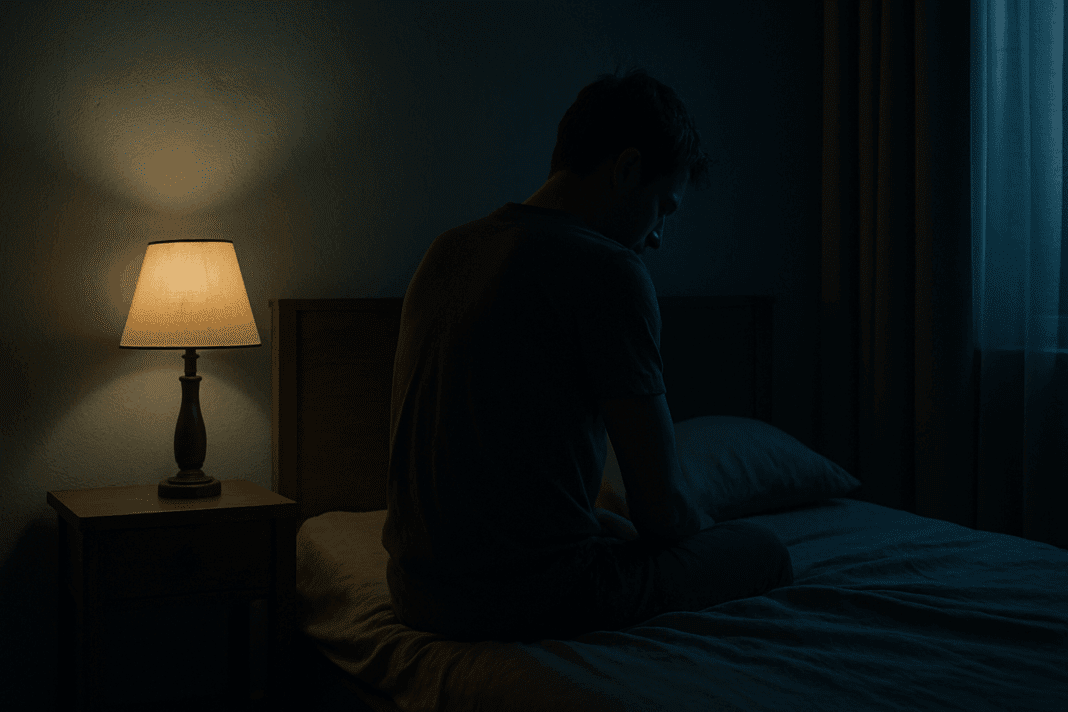In the quiet hours of the night, when the world slows down and lights fade, most people find solace in the rhythm of sleep. Yet, for many others, bedtime stirs something far less comforting—a quiet but potent dread that surfaces just as they attempt to rest. The pressing question, “why am I scared to sleep?” isn’t simply a fleeting thought; it often signals deeper psychological, emotional, and physiological concerns that can significantly disrupt a person’s quality of life. This fear is far more common than we realize and reflects a complex intersection of mental health, trauma, and the human body’s stress response system.
You may also like: 12 Critical Signs to Watch For: How to Know If You Have Sleep Insomnia and What to Do Next
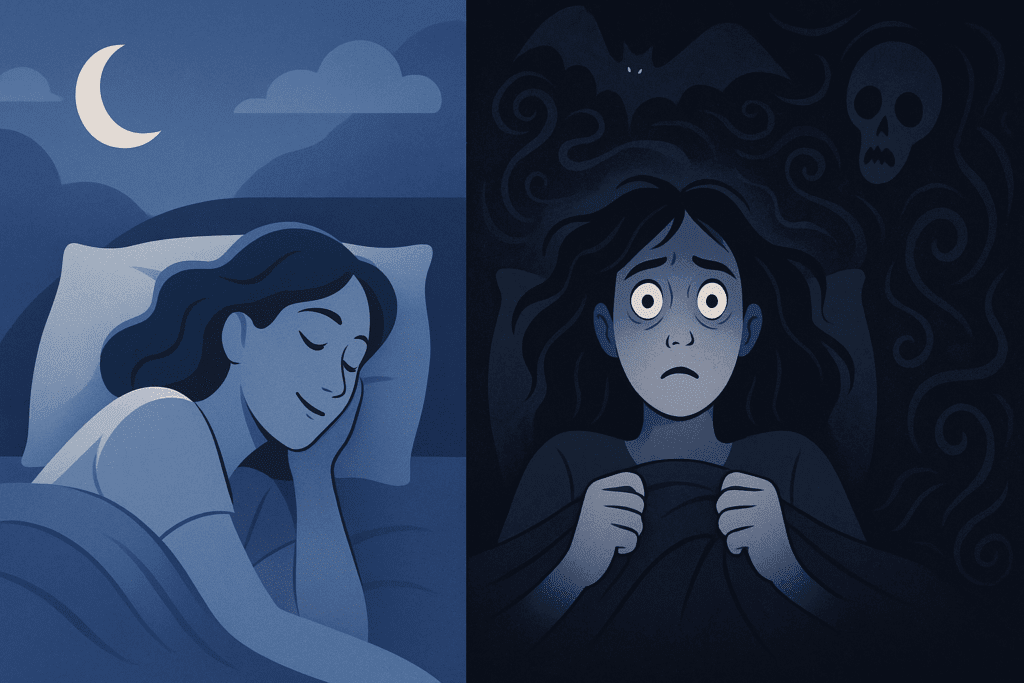
Understanding the Landscape of Sleep-Related Fear
Sleep is essential for human health, yet for individuals grappling with the fear of falling asleep, it can become a source of intense anxiety. This fear—often categorized medically as somniphobia or sleep anxiety—can stem from various origins, including traumatic events, anxiety disorders, and medical conditions that associate sleep with danger, vulnerability, or loss of control. The fear of sleep can manifest in countless ways, from irrational thoughts about dying during the night to compulsive behaviors that delay bedtime. This phobia of sleeping can be deeply distressing, often leading to chronic fatigue, impaired cognitive functioning, and significant emotional turmoil.
To understand why sleep becomes such a frightening experience, we must first explore the body’s stress-response mechanisms. At night, the body typically winds down through the parasympathetic nervous system, facilitating rest and restoration. However, in individuals with heightened anxiety, the sympathetic nervous system often remains activated, triggering a fight-or-flight response instead of relaxation. This physiological state makes it nearly impossible to transition into sleep peacefully, reinforcing a cycle of fear and sleeplessness.
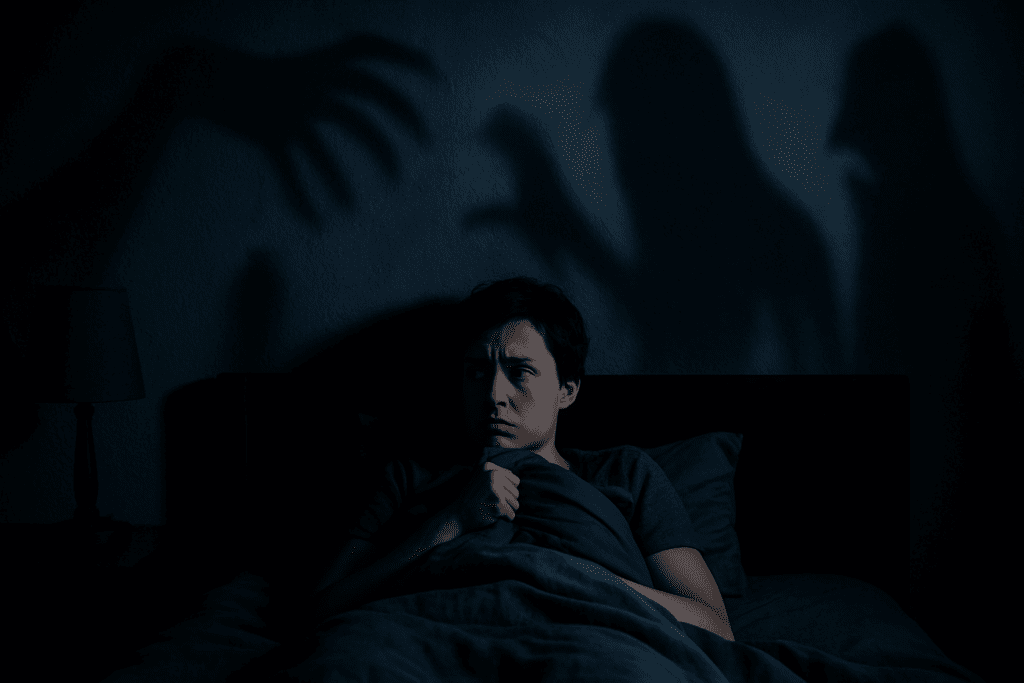
Trauma and the Genesis of Nighttime Fear
One of the most overlooked yet impactful contributors to the fear of falling asleep is unresolved trauma. Post-traumatic stress disorder (PTSD), for example, often includes recurrent nightmares, night terrors, or sleep paralysis—all of which can turn the concept of sleep into a psychologically unsafe territory. People with trauma histories may associate nightfall with vulnerability or danger, especially if traumatic events occurred during sleeping hours. As a result, sleep itself becomes a trigger, and the bedroom transforms from a sanctuary into a battlefield of intrusive thoughts and fear.
Nighttime anxiety also commonly involves anticipatory fear—the dread of what might happen when consciousness fades. For some, this translates into a fear of never waking up or losing control over their thoughts. In others, it appears as an irrational but deeply ingrained fear of the dark or silence. Over time, these thoughts can become habitual, making bedtime a predictable moment of distress. The fear of sleeplessness further compounds the issue, as individuals begin to worry about the effects of another night without rest, inadvertently reinforcing the cycle of anxiety.
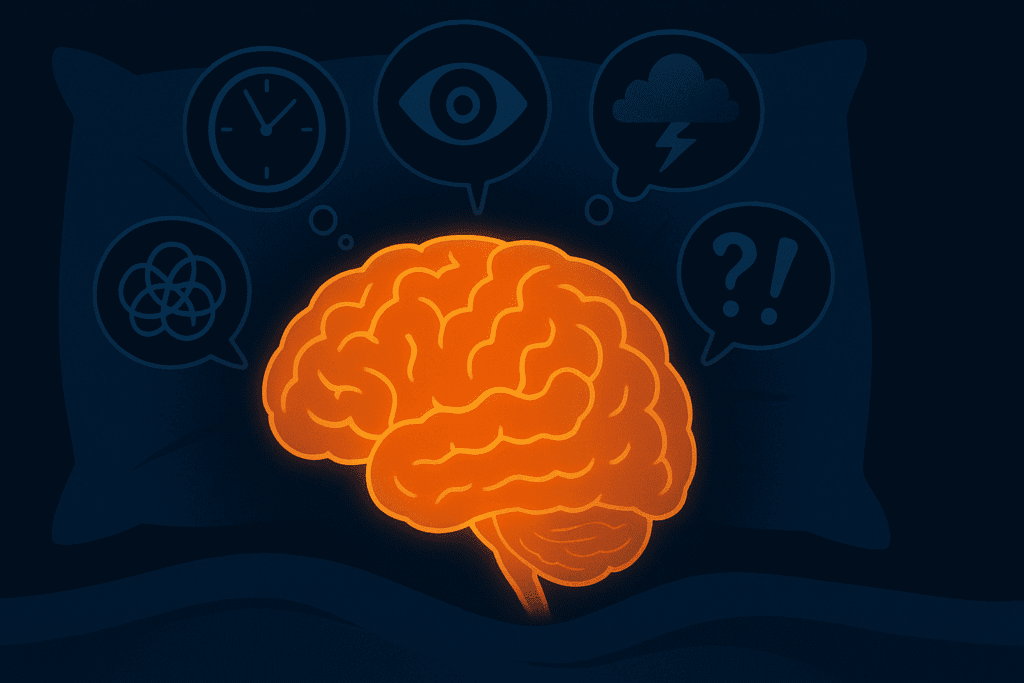
Cognitive Patterns That Feed the Fear
Cognitive distortions play a significant role in perpetuating the fear of sleep. Catastrophizing is especially common among individuals who ask themselves, “why am I scared to sleep?” They may become fixated on worst-case scenarios: the belief that falling asleep could mean never waking up, that they might stop breathing, or that something terrible will occur while unconscious. These thought patterns are not grounded in medical reality but can feel deeply convincing to someone with anxiety.
Another key contributor is hyperarousal, a state where the mind remains excessively alert even when the body is physically exhausted. Individuals may ruminate over minor worries, amplify their concerns, and continuously check for danger. This kind of vigilance is incompatible with the act of letting go that sleep requires. The mind’s inability to shut down naturally heightens the phobia of sleeping and creates a perpetual loop of fear and fatigue.
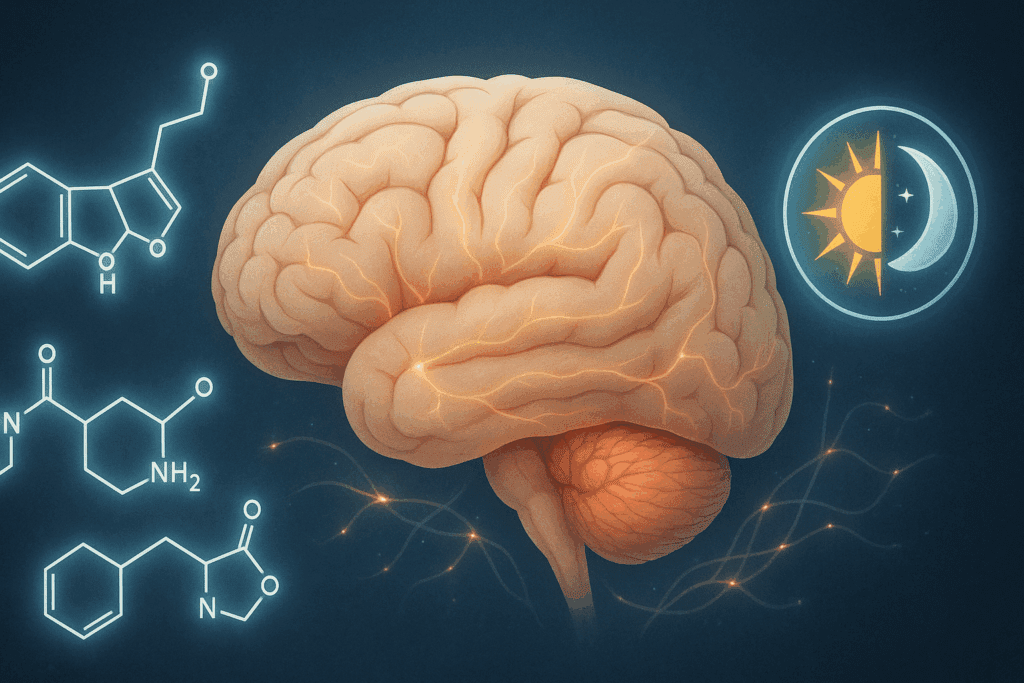
Biological and Neurological Underpinnings
From a neurological perspective, disruptions in neurotransmitter balance can also foster a fear of sleep. Neurochemicals like serotonin, melatonin, and gamma-aminobutyric acid (GABA) are critical to regulating sleep cycles and emotional stability. An imbalance in any of these systems—whether due to chronic stress, hormonal shifts, or genetic predispositions—can disrupt circadian rhythms and lead to a heightened fear response at night.
Moreover, individuals with generalized anxiety disorder (GAD), panic disorder, or obsessive-compulsive disorder (OCD) may be more susceptible to the fear of sleeplessness due to their brain’s hyperactive amygdala, the region responsible for processing fear. This overactive neural circuitry can create heightened responses to benign stimuli, including ordinary nighttime sounds or sensations. In essence, their brains are primed to perceive sleep as a threat rather than a relief.
Why Am I Scared to Sleep? Uncovering the Psychological Triggers
Understanding the psychological triggers behind sleep-related fear requires a deep dive into personal history, emotional memory, and mental health status. In many cases, early childhood experiences play a significant role. Children who experienced neglect, night-time abuse, or were frequently left alone in the dark may carry these associations into adulthood, unknowingly linking bedtime with emotional distress.
Another psychological trigger involves existential anxiety. Some individuals fear the loss of control that comes with sleep—a state where consciousness temporarily ceases, and the ability to respond to danger is reduced. This fear of the unknown can be especially pronounced in those with health anxiety or death anxiety, leading to compulsive bedtime rituals meant to stave off perceived risks.
Sleep-related phobias may also be reinforced by cultural or familial messages. Families that de-emphasize the importance of mental health may inadvertently encourage the suppression of anxiety, which then resurfaces in vulnerable moments like bedtime. Similarly, individuals raised in high-stress households may internalize the belief that rest is a luxury or a form of weakness, thereby associating sleep with guilt or inadequacy.
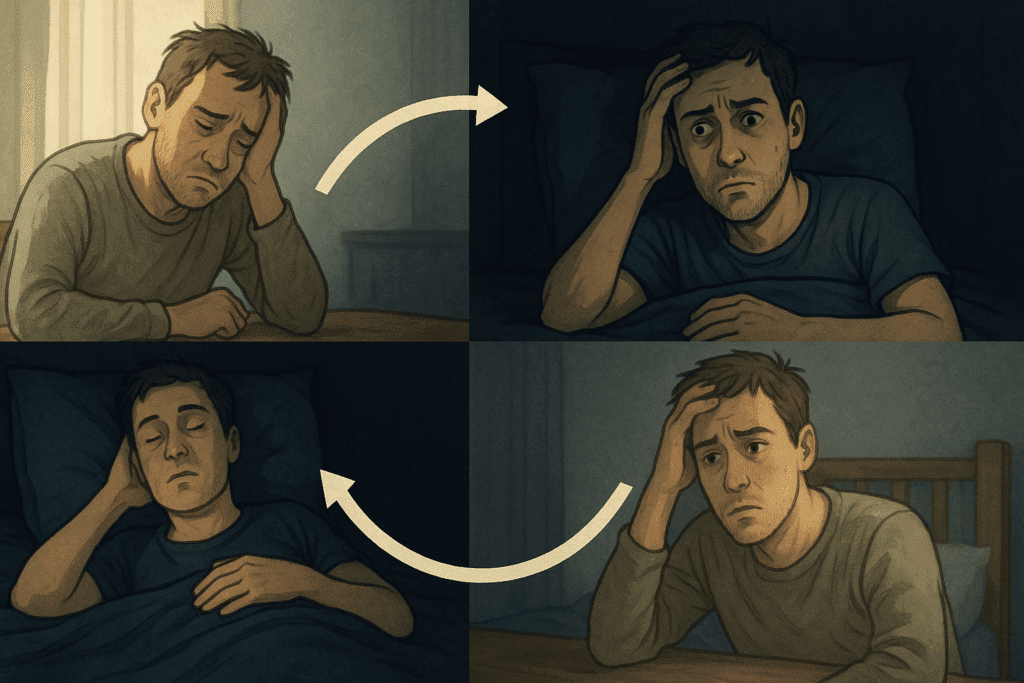
The Vicious Cycle of Fatigue and Sleep Anxiety
When fear of falling asleep becomes chronic, it often leads to sleep deprivation, which only exacerbates anxiety. This fatigue-sleep-anxiety cycle is particularly dangerous because it undermines both physical and mental resilience. As sleep deprivation accumulates, cognitive functions such as memory, attention, and emotional regulation decline. These impairments make it harder to implement healthy coping mechanisms and more likely to succumb to irrational fears.
Interestingly, the body begins to perceive bedtime not as a time of relief but as a threat. Cortisol levels spike in anticipation of sleep, the exact opposite of what is biologically intended. This hormonal misalignment further hinders rest and contributes to physical symptoms such as heart palpitations, shortness of breath, and restlessness, all of which reinforce the phobia of sleeping.
In this context, the fear of sleeplessness itself becomes a self-fulfilling prophecy. Worrying about not being able to sleep creates a heightened state of arousal, making restful sleep even more elusive. Individuals may attempt to cope through avoidance—engaging in distracting activities late into the night, using screens excessively, or consuming stimulants—all of which compound the problem in the long term.
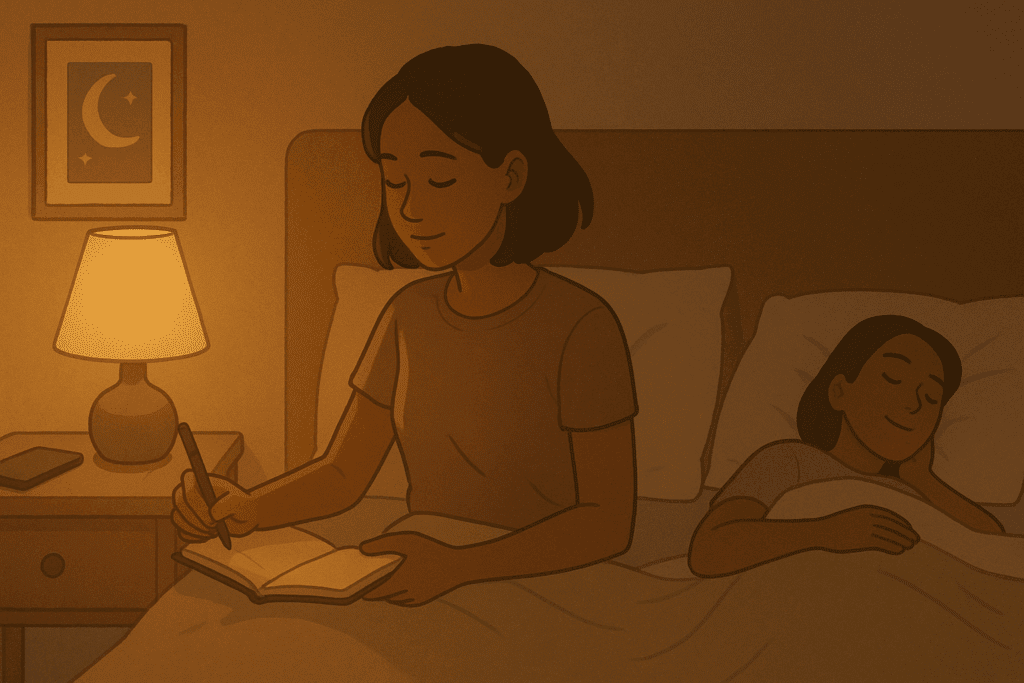
Why Am I Scared to Sleep? Exploring the Role of Sleep Disorders
For some individuals, the answer to “why am I scared to sleep?” lies in undiagnosed sleep disorders that generate real and repeated distress. Conditions like sleep apnea, insomnia, and parasomnias such as sleepwalking or night terrors can make the act of sleeping physically and emotionally unsettling. Sleep apnea, for example, causes repeated interruptions in breathing during the night, leading to sudden awakenings and feelings of suffocation.
Similarly, those who suffer from chronic insomnia often associate their bed with frustration and anxiety, as it becomes a symbol of failure to fall asleep. Over time, this negative conditioning can lead to sleep-related phobias. Parasomnias, which involve abnormal behaviors during sleep, can also create a fear of losing control, as individuals may engage in activities they cannot remember upon waking.
It is also worth noting that individuals with narcolepsy may develop a fear of sleep due to the unpredictability of their sleep-wake patterns. They might fear falling asleep at inappropriate times or experiencing sleep paralysis, a phenomenon where the mind awakens but the body remains immobile. These experiences can be profoundly disturbing and lead to heightened anxiety around both daytime and nighttime sleep episodes.
The Social and Environmental Impact of Nighttime Anxiety
Fear of sleep doesn’t exist in a vacuum. Its impact extends into all areas of life, including personal relationships, work performance, and social engagement. Individuals who chronically avoid sleep may become irritable, withdrawn, and emotionally distant. The resulting fatigue can impair communication and reduce empathy, straining relationships and increasing isolation.
Workplace performance also suffers. Chronic sleep deprivation leads to decreased productivity, reduced creativity, and heightened risk of errors—particularly in jobs that require sustained attention or decision-making. These consequences can create a feedback loop of stress and anxiety, reinforcing the fear of sleeplessness and contributing to burnout.
Environmental factors further complicate the issue. Poor sleep hygiene—such as excessive noise, uncomfortable bedding, or bright lighting—can amplify nighttime anxiety. Additionally, cultural stigmas around mental health may prevent individuals from seeking help, leading them to suffer in silence and normalize their fear of sleep as an immutable part of life.
Why Am I Scared to Sleep? Strategies for Breaking the Cycle
Recognizing the need for intervention is the first step toward overcoming the phobia of sleeping. A multi-dimensional approach that integrates cognitive-behavioral therapy (CBT), mindfulness, and environmental adjustments has been shown to yield the most sustainable results. CBT helps individuals challenge and reframe irrational beliefs about sleep, replacing catastrophic thinking with more balanced and realistic thoughts.
Mindfulness practices, such as progressive muscle relaxation and guided imagery, can help retrain the body’s stress response. These techniques foster a sense of safety and control, which are critical for reducing hyperarousal and facilitating the onset of sleep. Breathing exercises and meditation can also lower cortisol levels and promote the release of melatonin, supporting the body’s natural sleep cycle.
Creating a sleep-conducive environment is another essential component. This includes establishing a consistent bedtime routine, limiting screen exposure before bed, and ensuring the sleep environment is dark, quiet, and cool. Limiting caffeine and alcohol intake can also reduce physiological arousal and make it easier to fall asleep.
Professional support should not be underestimated. Consulting with a sleep specialist or a licensed therapist can provide targeted interventions, including the use of medication when necessary. Pharmacological options, while not ideal for long-term use, may offer temporary relief and create an opportunity to implement healthier sleep habits.
Cultivating a New Relationship with Sleep
Shifting from fear to trust in the sleep process requires time, patience, and consistency. For many, the process begins with simply acknowledging the fear without judgment. Understanding that sleep anxiety is a learned response—not a personal failure—is crucial in breaking the cycle. Gradually reintroducing positive associations with bedtime, such as reading a calming book or listening to soothing music, can help create a new narrative around sleep.
It is also important to foster self-compassion. The fear of falling asleep is often accompanied by feelings of shame or embarrassment, particularly in a society that glorifies productivity and undervalues rest. Reframing sleep as a vital, healing act rather than a passive indulgence can help individuals reclaim their right to rest without guilt.
Daily journaling may be helpful in identifying patterns and triggers. By reflecting on what thoughts or events precede sleep anxiety, individuals can begin to disrupt these patterns and insert healthier coping strategies. Sleep tracking devices, when used mindfully, can also offer insight into progress and highlight improvements over time.
Frequently Asked Questions: Expert Guidance on Nighttime Anxiety and the Fear of Sleep
What makes the fear of falling asleep different from general anxiety disorders?
While generalized anxiety disorder (GAD) often manifests throughout the day, the fear of falling asleep is specifically tied to the nighttime transition into unconsciousness. Unlike broad-spectrum anxiety, this condition can trigger distress only at bedtime, despite a relatively calm day. One distinguishing factor is that people experiencing this phobia may function normally during the day but become overwhelmed with fear when anticipating sleep. This specific temporal association means that targeted strategies are often more effective than general anxiety treatments. Understanding this unique timing helps mental health professionals create more precise interventions for clients facing sleep-related fears.
Why am I scared to sleep even when I feel physically exhausted?
This paradox often emerges when psychological resistance outweighs physiological fatigue. The body may be pleading for rest, but the brain remains in a state of alertness due to emotional triggers or subconscious associations with danger during sleep. People who have experienced night-time trauma or episodes of sleep paralysis may subconsciously equate sleep with a loss of safety, regardless of how tired they feel. It’s also common for the fear of sleeplessness to create anticipatory anxiety, making sleep feel like an impending failure rather than a restorative process. Recognizing this mind-body conflict is the first step toward reshaping those associations through therapeutic intervention.
Can fear of sleep develop suddenly, or is it always gradual?
Though it often builds over time, the fear of sleep can emerge quite suddenly, particularly after a triggering event. A single night of intense nightmares, a traumatic news story, or even witnessing a health scare can rapidly associate bedtime with threat. This immediate onset can be disorienting, especially for individuals who previously had no issues with sleep. Sudden onset cases often require a different therapeutic approach that incorporates acute trauma treatment and mindfulness strategies to reduce the initial emotional charge. Timely intervention can prevent the fear from becoming a chronic issue.
How is the phobia of sleeping typically diagnosed and treated by professionals?
While not always formally labeled as a distinct phobia in clinical manuals, the phobia of sleeping is increasingly recognized through symptom-based assessment in therapy settings. Professionals often look for behavioral patterns such as prolonged bedtime routines, chronic sleep avoidance, and disproportionate worry about falling asleep. Cognitive-behavioral therapy (CBT) is one of the most effective approaches, particularly when tailored with exposure techniques to gradually desensitize the individual to bedtime triggers. Some clinicians also incorporate Acceptance and Commitment Therapy (ACT) or Eye Movement Desensitization and Reprocessing (EMDR) when trauma plays a central role. A comprehensive plan often includes both therapeutic and lifestyle-based solutions.
Are there any long-term health risks linked to persistent fear of sleeplessness?
Yes, chronic fear of sleeplessness can lead to serious long-term health consequences beyond fatigue. It contributes to systemic stress that impairs immune function, increases inflammation, and disrupts metabolic regulation. Over time, individuals may experience worsened cardiovascular health, hormone imbalances, and increased susceptibility to depression. The constant strain on mental focus and emotional resilience can also deteriorate cognitive function and lead to feelings of detachment or dissociation. Addressing the root causes early not only improves sleep quality but also prevents broader health deterioration.
How can people differentiate between a fear of falling asleep and insomnia?
While they often co-occur, the fear of falling asleep and insomnia stem from different psychological roots. Insomnia typically results from poor sleep hygiene, stress, or physiological imbalances and may not carry an emotional fear component. Conversely, individuals who fear sleep often dread the moment they close their eyes, experiencing panic or intrusive thoughts unrelated to actual sleep performance. In some cases, people with this fear actually sleep for normal durations once they finally fall asleep, distinguishing it from clinical insomnia. This distinction is crucial for developing an accurate treatment plan and avoiding unnecessary medication.
Why am I scared to sleep when nothing bad has ever happened to me at night?
This question is more common than many realize. Not all fear of sleep stems from direct trauma; some cases are rooted in vicarious learning or subconscious associations. For example, media portrayals of nighttime dangers, stories shared by others, or a general sense of vulnerability can be enough to plant the seed of fear. In other cases, neurobiological factors like heightened arousal or dysregulated cortisol cycles may predispose someone to nighttime anxiety. The fear can also reflect a symbolic concern—such as fear of death, loss of control, or failure—that finds expression during vulnerable moments like bedtime.
Are there cultural or societal influences that increase the likelihood of developing a fear of sleep?
Absolutely. Cultural attitudes toward rest, productivity, and vulnerability play a major role in how we perceive sleep. In hyper-productive societies, rest is often undervalued, and individuals may internalize guilt for “wasting time” by sleeping. Additionally, cultures that emphasize fear-based religious or supernatural beliefs may instill a subconscious dread of nightfall or spiritual encounters during sleep. Societal messaging through horror films or sensational news can also intensify these associations, particularly in children and young adults. Understanding these cultural overlays can help individuals unpack inherited beliefs that shape their phobia of sleeping.
How can I talk to a loved one about their fear of sleep without making them feel ashamed?
Approaching this conversation with empathy and curiosity rather than judgment is essential. Start by acknowledging the legitimacy of their experience, even if you don’t fully understand it. Asking open-ended questions like “What does nighttime feel like for you?” allows them to describe their fear without feeling cornered. Avoid minimizing their emotions or offering quick fixes, as these responses often come across as dismissive. Sharing educational resources or gently suggesting therapy as a supportive option can open the door to healing. Above all, patience and a nonjudgmental presence can do more than any single piece of advice.
Why am I scared to sleep even after trying every self-help method I can find?
When self-help strategies fail, it’s often because the root of the fear lies deeper than behavioral adjustments can reach. Techniques like guided meditation or better sleep hygiene are helpful, but they may not address underlying trauma, existential anxiety, or neurochemical imbalances. In such cases, professional intervention becomes not just beneficial but necessary. Licensed therapists can help unearth subconscious associations and tailor interventions that go beyond generic solutions. Remember, the fear of sleep is not a failure of willpower—it is a symptom that deserves professional attention, just like any other health condition.
Final Reflections: Reclaiming Rest in a Fear-Driven World
In a culture that often overlooks the psychological dimensions of sleep, the question “why am I scared to sleep?” opens a powerful dialogue about the intersection of mental health, trauma, and physiology. Nighttime anxiety is not a trivial inconvenience—it is a signal from the body and mind that something deeper requires attention. The fear of sleep, the fear of sleeplessness, and the broader phobia of sleeping are not isolated experiences but reflect a growing need for integrated, compassionate care.
Through a combination of psychological insight, behavioral strategies, and medical support, it is entirely possible to transform fear into calm and anxiety into rest. Reclaiming a peaceful relationship with sleep is not just about getting through the night; it is about restoring a sense of safety in one’s own body. For those who live with the daily dread of bedtime, this journey may be long, but it is never without hope.
With proper understanding and expert guidance, the fear that once defined the night can give way to a new dawn—one marked by renewal, clarity, and healing. Ultimately, the act of facing the question “why am I scared to sleep?” is an act of courage—a commitment to healing the very core of one’s well-being and embracing the transformative power of rest.


